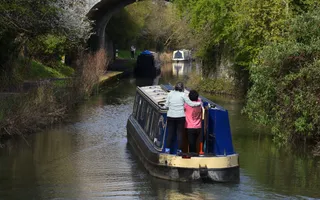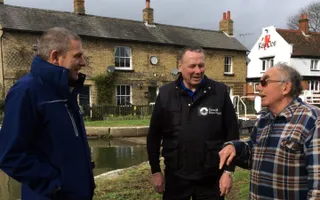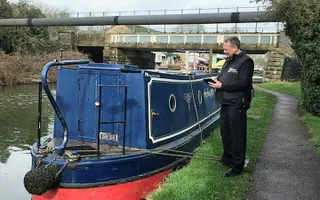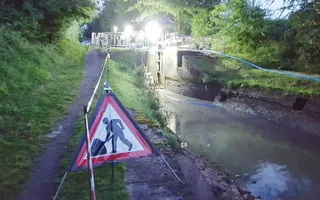Understandably, boaters ask us questions about what this means in real life. Here are our answers to the most frequently asked questions.
Continuous cruising FAQs
If you're a continuous cruiser, you need to move your boat regularly to stay within the T&Cs of your licence. Otherwise, we may restrict or remove the boat licence that you're allowed to have.
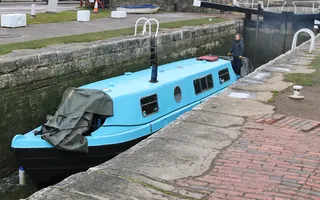
Why do we have rules about cruising?
We're trying to make things fair for all boaters by making sure everyone follows our existing rules. The law and our licence conditions explicitly say that boaters without a home mooring – our continuous cruisers – must 'bona fide navigate'. The fact that some boaters choose not to do so is not fair to everyone else. As the navigation authority, we've got a responsibility to manage the waterways fairly and safely for all boaters.
What do we mean by bona fide navigation?
To grant a boat licence for a boat without a home mooring, we must be satisfied that you will use it for 'bona fide navigation'. 'Bona fide' is Latin for 'with good faith' and is used by lawyers to mean 'sincerely' or 'genuinely.' We usually refer to 'bona fide navigating' as 'continuous cruising.' Our terms and conditions set out the legal requirements of continuous cruising. It's about showing us that:
- You are genuinely cruising a fair range of our network. Our team looks at the range of the furthest points your boat has visited over the year. If you're cruising only a small range, you may be restricted when you come to renewing your licence. What's important is that you're genuinely cruising on a journey around the network, not just remaining in a relatively small area, shuttling back and forth.
- You're not staying longer than 14 days on regular (unsigned) stretches of the canal or longer than what the short-stay mooring signs tell you without our agreement. You may occasionally need to stay somewhere longer due to breakdown, illness or other emergencies, but you do need to get agreement from the licensing, compliance and enforcement team if this happens.
- You need to be genuinely navigating around our waterways, not staying in a small area. For example, if you boat in a five-mile area for most of your licence and then went on one 60-mile trip over the course of two weeks, this wouldn't meet our requirements for bona fide navigation. If you have to regularly stay in one place or a limited area (perhaps for work, or because your children need to go to school), then you need to consider how you'll continue to genuinely cruise throughout the whole licence period.
How far does my boat need to move?
This is one of the most asked questions and the answer is not as simple as anyone would like.
The British Waterways Act 1995 unhelpfully did not set a minimum distance or range. So, we've had to spend a long time talking to boaters' groups, looking at previous Court Judgments and taking legal advice so we can come to a fair interpretation of this law, which is what appears in our terms and conditions.
We don't set a rigid pattern – that would be going against the relaxed spirit of cruising. Also, we understand that sometimes boats will turn around every so often if they reach the end of a canal, revisit a favourite spot once in a while or go back to refuel.
You'll need to continually move from place to place on a journey, rather than just shuttling back and forth between places and remaining in a small area. For more information, please see our guidance for boaters without a home mooring.
What if I'm moving a new boat or moving my boat for repair?
Your cruising needs to be bona fide throughout the whole licence period. Buying a boat from one area and travelling to and remaining in another small area of the network for the majority of the licence may not be considered bona fide navigation when reviewing your cruising at the end of your licence. If, after completing the journey to the intended cruising area, the boat overstays or shuttles to remain in a small area, it is likely we will not consider this as bona fide navigation. The boat needs to be genuinely navigating around our waterways on a continuous journey throughout the whole licence period.
For example, a boat is purchased in Location A and travels 30 miles in a month to its intended cruising range, which is between Location B and Location C. The distance between Locations B and C is 10 miles. The boat remains between these two locations for the remaining 11 months of the licence. It is unlikely that we would consider this bona fide navigation. The times and distances used here are just an example. If you're in doubt, please contact the licensing, compliance and enforcement team for advice.
The same applies to long journeys purely for the purposes of maintenance. If the boat is then returned to a small area of the network, as above, the journey for those repairs won't mean that the cruising over the licence period meets our guidance for boaters without a home mooring.
So how do you keep track of all the boats?
You may have seen our team out and about on the towpath noting down boat numbers. This helps us to monitor a boat's movement over the course of a year. When your continuous cruising licence comes up for renewal, it's this movement pattern we look at.
How do you review my cruising?
If it's your first-ever cruising licence, we look back at your boating over the first 10 months of your licence. If you've had more than one boat licence, we look back at the first 10 months of your current licence and the last two months of your previous licence. We do this so we can write to you before it's time to renew your licence. We check your overall cruising range, your movement pattern and if you've been overstaying a lot.
What if there's a closed lock or bridge and I can't move my boat?
Firstly, always use our notices to plan your journeys so you don't get stuck. Any planned stoppages are published as soon as possible to give you time to take an alternative route. If an emergency stoppage does happen, don't worry, we'll help you work out a plan. If you think you're going to be stuck in one place for longer than 14 days or are worried that your 'movement pattern' might break the rules, then contact our team.
What if my boat breaks down or I'm ill and can't move my boat?
Request an extended stay by logging into your boat licensing account as soon as possible. If you're only going to be stuck for a few extra days while your boat is fixed or you recover from your illness, then we can arrange for you to stay a little longer. If it's a major breakdown and you will need a lot of time to make repairs, then you need to make arrangements to get to a boat yard or mooring site whilst those repairs are carried out, or even get the boat craned out of the water for repairs.
What if I or someone on my boat is expecting a baby?
Contact us so we can agree, in advance, for you to stay longer in one place. This is usually one month extra on either side of the birth – even if the baby decides to come a little earlier or later than planned. We can also arrange further adjustments up to 26 weeks after the birth.
I have a disability, it's difficult to follow the continuous cruiser rules, what do I do?
As a disabled boater, you are entitled to 'reasonable adjustments'. Each adjustment depends on your circumstances but, for example, you may be able to:
- reduce your cruising range or movement pattern along a particular stretch of waterway
- get permission to moor longer than the stated stay time limits or in a specific location
- get help with navigating, operating locks or help with getting on and off your boat
What is regarded as a 'reasonable adjustment' will be different depending on your own circumstances and whether we're reasonably able to provide the adjustment. Here's what you need to do:
- Talk to our licensing, compliance and enforcement team about your situation.
- Read our disabled boaters' information and, if you think you are eligible for an adjustment...
- Fill in our equality questionnaire. You will need to share evidence about how your disability affects you and why it means you can't follow our continuous cruiser rules. If you would like a paperless way of completing the equality questionnaire, please let us know and we will arrange to send you an electronic version.
What about boaters who need extra support?
If you're a boater in need of help, or you're concerned about a boater who you think might be vulnerable, contact our team or call 0303 040 4040. See our list of organisations that can help you with everything from debt to mental health problems. We have a dedicated welfare team who can offer extra support to boaters.
You can also contact the waterways chaplains who offer independent support and advice.
If you are concerned that someone may be an immediate danger to themselves or someone else, call the emergency services.
Last Edited: 20 October 2025


Stay connected
Sign up to our newsletter and discover how we protect canals and help nature thrive


